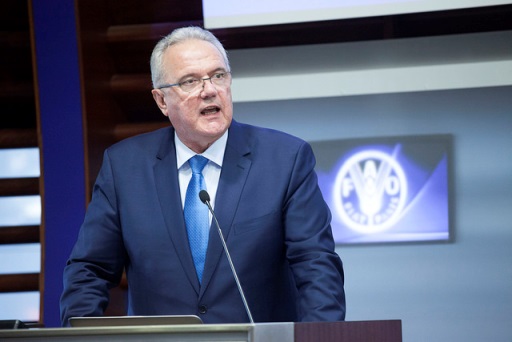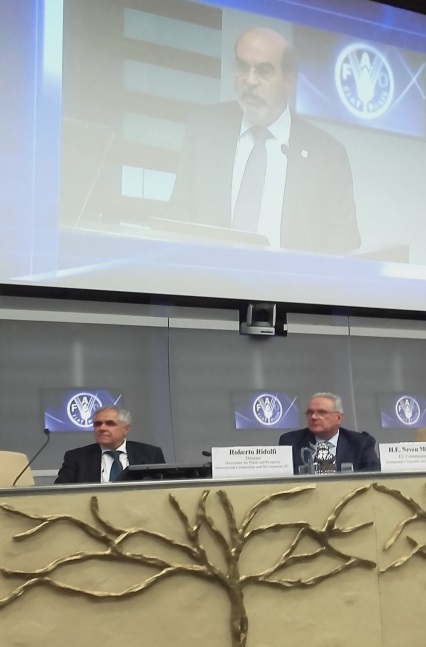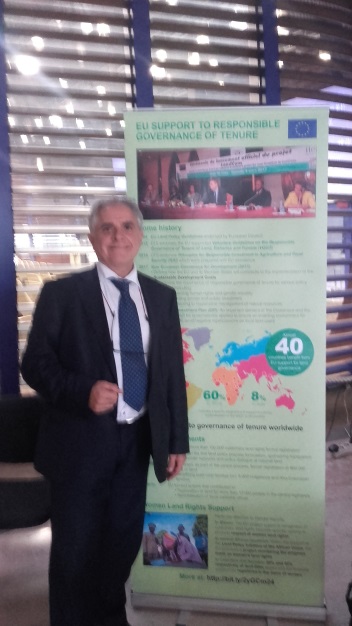High-level Event to commemorate the 5th anniversary of the VGGT - main messages from Rome
Discussion details
“Millions of people around the globe depend on farmland, fisheries and forests for their livelihoods. But the increasing pressures on our precious natural resources carry multiple social, economic and environmental threats. In their most serious expression, they can lead to conflict, displacement and hunger. So it's no exaggeration to state that the issues we are here to discuss today are fundamental issues of human rights and relate to the future of humanity”.
With these

words, Mr Neven Mimica, the EU Commissioner in charge of International Cooperation and Development, intervened in the opening remarks of the high-level event to commemorate the 5th anniversary of the VGGT- Voluntary Guidelines for responsible governance of tenure of land, fisheries and forests. The event was jointly organized by the FAO and EU on the 10th October 2017 at FAO Headquarters in Rome.
In his speech, the EU Commissioner Mr Nevem Mimica highlighted that the EU has long been a strong supporter of a responsible approach to the governance of tenure. Mr Mimica confirmed that these principles are enshrined in the new European Consensus on Development, which reiterates the importance of equitable access to land use and water, particularly for women, local and indigenous people.
The VGGT are a powerful “tool” to support the protection of legitimate land right-holders and the resources on which they depend, while securing, at the same time, the land needed for responsible investment to boost agricultural growth and rural transformation. The Commissioner underlined both the importance of responsible governance of tenure and of the application of the VGGT for the implementation of the External Investment Plan and, in particular AgriFI, in unlocking and accelerating investments in small-holders agriculture and helping them get out of poverty and hunger.
The involvement of the private sector in the discussion about the promotion of responsible land governance is fundamental to the creation of the enabling environment for new investments beneficial to all “land stakeholders”.
The need to engage the private sector more was a major challenge underlined by the Director General of FAO, Dr José Graziano da Silva.
A second major challenge

, which is also at stake for agribusiness projects promoted by the EU, is to involve more women in all dialogue and activities related to the promotion of the VGGT and more broadly in land governance initiatives.
Finally, Da Silva stressed the importance of promoting more actions at local and grassroots level to ensure that multi-stakeholder platforms really take into account the claims and interests of the majority through the entire process.
How to make multi-stakeholders platforms more effective for the promotion of inclusive and responsible land governance has indeed been the central theme of debate during the event. Mr Roberto Ridolfi, Director of DEVCO Directorate for Planet and Prosperity, co-moderating the panel together with Ms Marcela Villarreal, Director, FAO Partnerships and South-South Cooperation Division, guided the audience particularly to reflect on the effectiveness of multi-stakeholder platforms.
Mr Ridolfi found that concerns by the actors working on the application of the VGGT are mainly centred on two issues. The first one is about the “process” and the need to “find the platform model that works for all” as well as through the entire process. The second issue, strictly related to the first, is to find more suitable conflict resolution mechanisms, in the platform and in the field. Mr Ridolfi challenged the audience by asking if these platforms are suited (and if it is right) to adopt a restorative justice principle as opposed to a retributive justice one. In the context of the application of the VGGT, this could imply finding a platform model where the private sector, often considered as the stakeholder acting against the interest of the most vulnerable, can be fully involved in all steps of the VGGT implementation, from the awareness raising to eventual actions needed to prevent and/or deal with illegitimate and illegal eviction from land.
Linked

to this, the importance of avoiding the criminalisation of the CSOs working to protect the rights of most vulnerable land users was also stressed. Among other issues, this requires working more effectively to raise the political willingness of governments, from national to local levels, to be involved in the understanding and application of the VGGT. On the other side, His Excellency Maya Moiwo Kaikai, Minister for Local Government and Rural Development, from Sierra Leone, stressed the importance of making more efforts to trust governments’ actions and the good faith of state institutions working to create the enabling environment for transparent and inclusive governance of tenure of natural resources.
Two final messages came out from the high-level event to commemorate the 5th anniversary of the VGGT. First, it is necessary to “bring back ethics to the table of dialogue” as stressed by His Excellency Pio Wennubst, Ambassador, Assistant Director General, Swiss Agency for Development and Cooperation.
Second, Ms Marcela Villarreal underlined that the work has just begun; the creation of multi-stakeholder platform is in itself a success, but it is just the first step. Multi-stakeholder dialogue must become “business as usual” and not an exception. It must guide all aspects of the VGGT implementation because this is the only way to make the process become a success, i.e. a process that takes into account claims of all actors across the diverse steps.

These main messages were also stressed during the discussions of the VGGT technical forum marking the 5th anniversary of the VGGTs. The Forum, funded by the EU and hosted by FAO, preceded the high-level event and its final outcome document was presented during the high-level event. Addressing the panellists of the high-level event and, more broadly, the CFS –Committee on World Food Security, the forum strongly encourages:
“Governments, UN agencies, development partners, holders of legitimate rights to land, fisheries and forests, CSOs and the private sector to keep momentum in use and application of the VGGT in light of the importance of governance of tenure for the realization of the human right to food and the achievement of the SDGs. To reach these outcomes, increased and more effective use of resources, coherence, accountability, more political support, and a long-term commitment are indispensable”.
You find the programme of the forum and of the VGGT event in the PDF file attacched, togheter with the outcome find the outcome document and material of all sessions of the VGGT technical forum (5th, 6th October) as well as information on the results of the High-level event (10th October) on this page.
Log in with your EU Login account to post or comment on the platform.